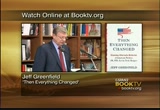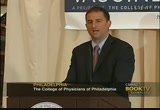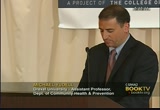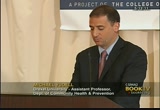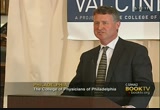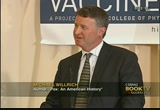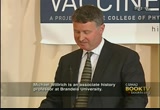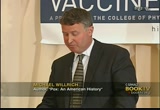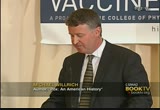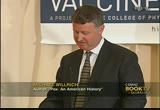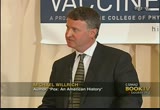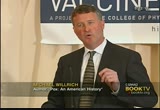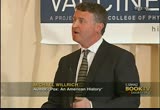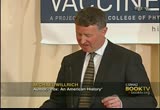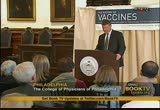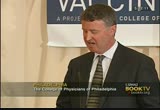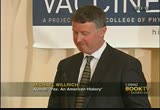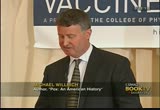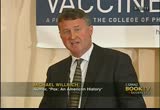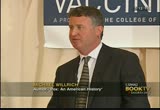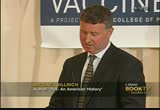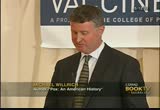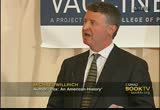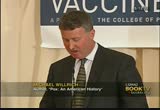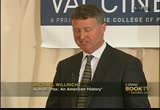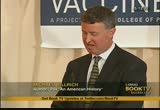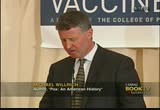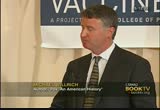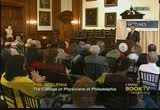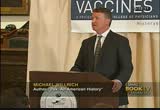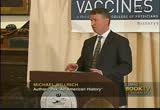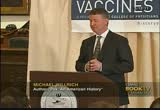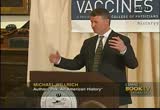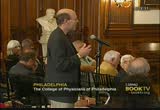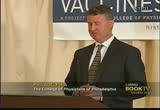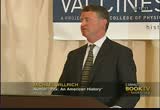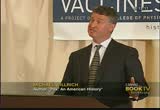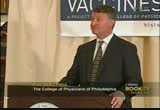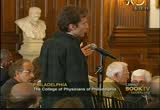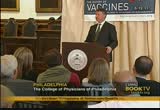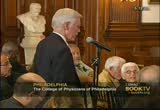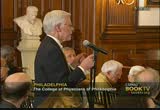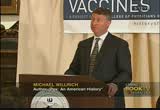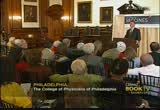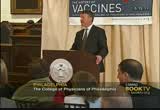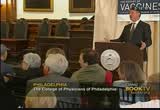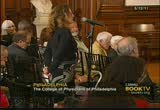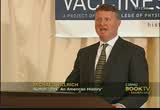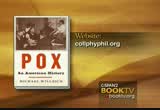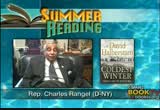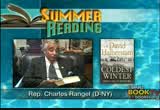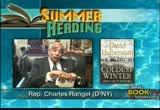tv Book TV CSPAN July 3, 2011 7:00am-8:00am EDT
7:00 am
>> up next michael willrich examines the american smallpox epidemic in the early 1900s. he details the government initiatives to deter the spread of these by requiring vaccinations and instituting the virus squads. this is about an hour. >> thank you, and thank you to kerry, thank you to the college for hosting such a wonderful event. in 1736 i lost one of my sons, a fine boy of four years old by the smallpox, taken in the common way. ilog regretted bitterly and still regret that i've not given it to him by an occupation. this i mention for the sake of
7:01 am
parents who admit that operation on the supposition that they should never forgive themselves if the child died under it. my example showing the regret may be the same either way and that therefore a safer should be chosen. so wrote benjamin franklin in his autobiography about his struggles, sadness and regret regarding the decision not to inactivate his young son against smallpox. the induced infection for inoculation far more dangerous than the vaccine was supplanted in the late 18th century offered lifelong immunity from the dreaded pox. yet franklin and others during the 18th and 19th centuries were beginning to struggle with the very issues about vaccination that we still face today and the issues that are brought to light in our distinguished speakers but. today it seems to emanate from concerns about the de baca believes that vaccines, vaccines for the overall birth of vaccines are responsible for dramatically increased rates of
7:02 am
autism. while we can partially understand the rise of anti-vaccine sentiment in the context of the history of the disorder, a much longer history to explain many of these impulses. one that examines historical nature of anti-vaccine campaigns and the relationship to concerns about expanding power of government, public health, but tensions between individual liberty and interest, scientific and medical hubris, and the way social class and race mediate these debates. the success of pox and i mean the book, not the disease, is that it is not simply a research and thoughtful work in the best traditions of historical profession, but it is an elegantly told story to exploit tensions that are at the core of the values that make up americans. so it gives me great pleasure to introduce doctor michael willrich from brandeis university which is associate professor and department of
7:03 am
history and, of course, as you note dr. willrich we talking about his book, "pox: an american history" published earlier this year by penguin press. dr. willrich's first book "city of courts" one for dissing bush john h. dunning prize awarded by the american historical association for the best book on any aspect as u.s. history and the william nelson cromwell prize for legal history. dr. willrich received his ph.d in history from the university of chicago. before that he worked for some years as a journalist in washington, d.c. writing for the "washington monthly," city paper, "the new republic" and other magazines. please give dr. willrich a very warm welcome. [applause] >> the thank you so much for that lovely introduction and thank you all for coming out this evening. it's terrific to be in this place. a beautiful building.
7:04 am
and it's got so many wonderful public programs going on right now, bringing the history of medicine and disease which is so important to our national history, to people not only in functions like this but over the internet and through publication. so it's a real honor to be here, and want to thank you for inviting me. as everyone in this room knows, vaccine longtailed as modern medicine's greatest invention have lately become the subject of a bitter public controversy. according to a 2010 report from the centers of disease, 40% of american parents of young children have refused or delayed one or more shots for their child. that's up from 23% in 2003.
7:05 am
so something is going on right now. this bike oval and evidence to the contrary, one in five american parents believe that vaccines cause autism. this disturbing statistic seems likely to hold true even after the recent publication in the british medical journal of a report debunking the original 1998 paper that launched the global vaccine autism scare. we are already witnessing the effects of parents decisions not to fully -- return a disease such as measles and whooping cough, that has largely disappeared from the united states until recently. last year california weathered its worst epidemic of whooping cough in over 60 years. more than 9000 cases of this vaccine preventable disease were reported in the state, and 10
7:06 am
incidents, most of whom were too young to get fascinated by. still, for all the sound and fury, today's vaccine controversy pales in comparison to the vaccine wars that took place in the united states at the turn of the 20th century. and this at the height of a nationwide epidemic of smallpox. as smallpox spread across the country between 1898-19 zero three, local, state and federal health officials enforce vaccination aggressively, sometimes even by physical force. at the nation's border along is railroad line, and in its public schools, factories, tenement districts in work camps. the government's vaccination campaign triggered massive resistance in the american people. american form anti-vaccination societies, and though they were
7:07 am
ready to abide the craft of the medical profession as deranged cranks, the anti-vaccinations arguments in fact resonated quite deeply with broader social concerns of the period, concerns about the growing scale and scope of the american state, concerns about medical liberty and the rights of parents. americans also mobilize the state houses to win banning compulsory vaccination. they challenged compulsory vaccination in the courts, caring the vaccination question all the way to the u.s. supreme court in 1905. they rioted in tenements and in the street. they forged vaccination certificates so the unvaccinated children could attend school. and perhaps most commonly, especially most common with most recent immigrants in the united
7:08 am
states in cities, they get infected family members from the authorities in order to prevent them from being hauled off to the local isolation hospital. the scale of this popular opposition is all the more remarkable, because smallpox was still the most feared of all the terrible diseases that afflicted humankind. smallpox was the deadliest killer in human history. in a typical outbreak it killed roughly a third of all the people it infected. smallpox killed 300 million people worldwide in the 20th century alone. that's more than all the bloody centuries wars combined. but smallpox as you all know enjoyed another dissension. this is the only contagious disease ever eradicated from the human species.
7:09 am
vaccination was crucial to that story. with each passing year, fewer and fewer people across the world have ever seen a case of smallpox. that goes for doctors and epidemiologists as well. so what was smallpox like? the disease as scientists have been able to see more recently under their electron microscopes did not exist 110 years ago, is cause by a virus, a bunch of proteins containing dna. fit in the seas caused by this virus highly contagious. it could be spread like a common cold, the flu, by saliva droplets from person-to-person, it could also be spread by virus particles on blankets and clothes.
7:10 am
but that was far less common than face-to-face contact. once the disease has entered, once the virus has entered a new host, the incubation period began. incubation period lasted for about 12 days. this was long enough in the age of steam for an italian immigrant to travel from a small village to the coast that naples, board the steamships, travel all the way to the united states, passed through ellis island and the medical inspection there, board a train to chicago and get off their, and then come down with the simpsons, the early symptoms of smallpox. those early symptoms were very high fever, severe back pain, often vomiting. it was a terrible kind of flulike condition. then miraculously the fever
7:11 am
started to subside and the person felt better. a person might even feel good enough to go to work or off to school. and that was when they started to become contagious. the virus had been replicating very rapidly. and ultimately it would produce this terrible skin sort of eruption by this rash that ravaged the skin, and was the most horrific visible sign of smallpox. that as all of this was going on, the virus was replicating in the internal organs as well and attacking them. so people usually when they died, died of acute respiratory failure. it was not a pleasant experience of any of it. most survivors, meanwhile, of smallpox, were left scarred for life left with deep scars all over their face.
7:12 am
many of them were blinded. so that was smallpox. but the turn-of-the-century epidemic brought a medical mystery. between 1898-19 zero three, hundreds of thousands of americans are infected with smallpox. these are according to the medical reports. i think many more than that were affected. but fewer than 10,000 people died. how could this be? we now know, we now understand that this was the first appearance in north america of a new form of smallpox that would become to be known as variola minor, that the classical smallpox now known as variola major. variola minor killed only, let's put that in quotation marks, about 1% of all whom it
7:13 am
affected. so ordinary americans see the disease spread very rapidly to the community, and spread rapidly because many people afflicted with it felt just well enough to go to work and earn their daily bread. ordinary americans who have seen the disease would not readily accept that it was smallpox. there was enormous diagnostic confusion, even among the medical profession, particularly him on country doctors. they thought this, they might've called breaking out disease. in fact public health officials understood this to be smallpox. they believe that at any moment a horrific epidemic of classical smallpox that killed, smallpox that people know, smallpox they read about a history books, at any moment such an epidemic would break out. and their fears seem to be confirmed by the fact that a
7:14 am
number of places epidemics of the mile smallpox were followed closely by smallpox a very strict smallpox. so during this wave of epidemic, many of the mild, killing roughly 1%, 2% of people it infected, new york lost 730 people to smallpox. in new orleans, 500 people died. in boston to understand the people died. in philadelphia there were 2500 reported cases, and 400 deaths. that's more on par with historical smallpox. and yet even after this great wave of epidemic, america remained in the words of one prominent health official in the period, the least vaccinated of any civilized country. , my book spends many pages in many wars trying to understand exactly why this is so. i could give you a short answer
7:15 am
right now. vaccination a century ago was a nasty business, and far riskier than it is today. and further, the vaccination question posed a real dilemma. the united states after all was a nation fiercely devoted to the principle of individual liberty. but the public health movement that had emerged here by 1900 was one of the most wildly invasive of individual rights in all the world. although public health has come a long way from 1900, this dilemma still resonates today. so pox tells the story of a forgotten american smallpox epidemic that killed relatively few people, but left a surprisingly deep impression upon american society,
7:16 am
government and the law. the book is a national story, but as epidemics are inherently local, as they are experienced, it is a national story made up of many local stories. so to give you a flavor of those local stories, i want to take a few minutes and tell you about one local place that, through no fault of its own, played a starring role in this american saga. kansas. in october 19 zero one, smallpox broke out in canton, which was then a prosperous international city of 76,000 souls. the trouble started with 18 -- eight year old kid to go with smallpox, followed closely by her father and all seven of her brothers and sisters. somehow her mother was not affected.
7:17 am
she must've had smallpox at another time for been vaccinated. i can only feel for her. there's nothing about her in the record but i can only fuel for being the only one in the house capable of taking care of all the others. in the middle of the night, pearls father awoke. in his delirium he bumped a table which knocked over a kerosene lamp. the ensuing blaze burned the house to the ground, but not before they got out and hundreds of neighbors rushed to the scene. halt of course were exposed to smallpox. with this improbable change of events, the chicago fire of 1871, the smallpox epidemic of 1901 began. can't and city officials jumped to action. they set up a municipal test house and the board of education
7:18 am
announced all public school children must be vaccinated immediately. but what did that mean exactly? vaccination a century ago was conducted not in the private pediatricians office under the trusted hands of a family physician, often outdoors in clinics, in schools, the workplaces and the like. the process involved taking hold of someone's arm, of their arm of course, taking a very sharp, lancet or nato, scoring the skin, usually drawing a little bit of blood but not too much and then taking some vaccine material which was made up of live virus that had been literally harvested from
7:19 am
infected sores on the belly of a calf. take a moment and think about that. taking that and adding that into the scores, and then letting the reactions take place over several days, people would experience sort of a constitutional disturbance. no, often a sore, swollen arm. when all was done they were left with a little scar that any of you all over maybe 40, 45 might have from a different process, because the smallpox vaccine will always produce this, if it takes. anyway, that was the vaccinati vaccination. the vaccine used in camden came from, where do you think? philadelphia, right? just across the delaware river. philadelphia was a major center of the nation's rising vaccine and pharmaceutical industry.
7:20 am
philadelphia was the place where wyatt and his brothers in addition to create some chemical compounds and the like, had a couple of cows and created their own vaccine. h. m. alexander, and others, the most important for our story, which is a u.s. forerunner of march pharmaceutical. the process, i won't go into too much now, but the process involved a combination of the stable in the laboratory. mulford had a full on laboratory to subprocess this vaccine, that they were harvested from infected calves out in the stables. so within a month, back to camden come within a month a third of the city's population had been vaccinated.
7:21 am
including 5000 of the city's 8000 school children. then the news spread. the news spread in camden that a 16 year-old boy named william brower had fallen ill to tetanus. tetanus was another one of those terrible diseases that vaccines have helped to bring in check. most people at the time called tetanus by another name, they called it lockjaw. the symptoms were a high fever, a tail till stiffness in the face, followed by excruciating contraction of the jaw and neck. the spine arched as convulsions wracked the body and the disease was often fatal. after william brower, the lockjaw struck 16 year-old lillian hardy, then nine year old anna cochran, an 11 year old thomas haselton. then 11 year old in warrington.
7:22 am
that then six-year-old frank, seven year old betsy roosevelt, and the lives continue to grow. soon, six of the school children were dead. within weeks, within weeks, three more would die of tetanus. as the parents of canton search for an explanation, and many pointed, to the vaccine and its manufacturers across the river. the parents charged the vaccine was corrupted, which was after all a plausible claim since vaccine was produced in a stable, and environment crawling with hey, does, bacteria, including news on occasion. but the camden board of health defended the vaccine makers and its own policy and compulsory vaccination. an official report, the board said that the children were dirty.
7:23 am
they had let their vaccine wound get filthy. and their parents were ignorant in how to keep those wounds clean. to sell this story to the press, the board of health hired a brilliant and eccentric young scientist who worked for the most implicated of the philadelphia vaccine company, h. k. mulford company. as scientist named was albert barnes. [laughter] as i told that name is well known in these parts. bonds would want to make a great fortune by making the antisept antiseptic. and you spend a fortune told and one of the great private collections of french ports, the barnes foundation. some new york newspaper but barnes' story but the parents of camden did not. in a letter in a they might have
7:24 am
sued but in 1900, the case law was stacked against them. so instead they launched a school strike. hundreds of parents refused to send their children to school. soon, half the city's public schools were empty. they can't and tetanus outbreak became an national news story. newspapers across the u.s. spread the story of children dying in terrible agony as helpless parents and physicians bore witness. even "the new york times," which was the most outspoken paper, particularly among the lower order, reported from camden that quote, vaccination has been far more fatal here than smallpox. the school strikes in camden were repeated in communities across the country from rochester, new york, to little
7:25 am
bit later berkeley, california. to make matters much worse, that same fall, the fall of 1901, the corner of st. louis announced his verdict in the cases of 13 schoolchildren of that city who had died of tetanus after taking the diphtheria anti-bacteria. a new life saving measure used for school children. the corner said the city health board hedges antitoxin taking from a horse, antitoxin forget there was made in horses, taken from the horse infected with tetanus. a horse called jim. the tragedy that camden and st. louis created a crisis of public confidence in vaccines at the very worst moment, at the height of a national smallpox epidemic. but here's the point to mull over. this crisis pointed out the fundamental contradiction of
7:26 am
american public health law at the turn of the 20th century. the government could order the public to get vaccinated whether they wanted to or not, but did absolutely nothing to ensure that the vaccines used in the process were safe or effective. the crisis inflamed the already widespread public opposition to compulsory vaccination during the smallpox epidemic in a period, and let us say many groups have their own reason for opposing compulsory vaccination, workers across the board, workers, many who worked with their hands were deeply concerned about the effect of vaccine might have on the ability to use their hands if only for a period of a few days. no system of working conversation -- worker's compensation existed. they were breadwinners. they were very much resistant to
7:27 am
compulsory vaccination. african-americans had no good reason to trust why doctors and the white public health profession during this period. during normal times, like doctors and hospitals ignored african-americans, ignore their medical needs that it was only during an epidemic like an epidemic of smallpox that all of a sudden the public health officials show up at the door, usually with a sheriff and the cops in tow to compel people to be vaccinated. so african-americans were deeply resisted in large numbers. christian scientist and other faith healers in the period pose obvious religious objectors to the practice. and many of the anti-vaccination societies were led by doctors, but doctors who practiced forms of alternative medicine, now called alternative medicine,
7:28 am
such as homeopathic and osteopathic and chiropractic, that had been marginalized with the rise of public health departments in the late 19th century. they get compulsory vaccinations and other part of the conspiracy that they called, that the state called state medicine. the camden tragedy galvanized the anti-vaccination group and triggered a national debate on vaccine safety. medical societies started to talk seriously about the need for a system of government regulation vaccine. some even called for turning vaccine production into a government monopoly, but this idea was ruled out as too socialistic. back then when they use the word socialism they had something, they have something in mind that really sounded like socialism, right? government in control of
7:29 am
production. anyway, while all of this was going on, a distinguished philadelphia bacteriologist named doctor joseph mcfarland was quietly investigating the cases. he collected information on similar cases, philadelphia, atlantic city, bristol pennsylvania, cleveland and other parts of the united states. in a paper that he eventually published in the lancet which was most prestigious medical journal of the air, mcfarland suggested that tetanus spores have found a way into the vaccine manufactured by a single maker, he called that maker vaccine the, but we know from the papers that he met the mulford company of philadelphia. finally, congress acted to try to restore public confidence in vaccines. in the spring of 1902, congress
7:30 am
enacted a biologics control act as president roosevelt signed into law. this act was a pioneering piece of legislation, set up a system of light the scene inspection of all makers of biologics products including vaccine, see her in antitoxin. it was the immediate forerunner and model for the much to refute and drug act which passed a few years later. the passage of this act i think, brings up a larger point, which is we are often very impatient with anti-vaccination and its components of vaccinations. and understandably, but at least a century ago, century and 10 years ago, out of these epidemics, a controversy. there were some very positive legacy including the regulation
7:31 am
and control, and also court decision. taken together, those court decision which culminated in the case of jacobsen versus massachusetts, a decision by the u.s. supreme court in 1905, taken together those cases would put public health authority on a much more assertive legal footing also creating some key protection for the civil liberties of individuals. i'm not going to go into details of all them right now but i'd be happy to talk about that in a few minutes in the q&a. perhaps most important, popular resistance during these epidemics top government officials that when it comes to public health, education can be far more effective than brute force. after 1905, few american communities ever saw another deadly outbreak of smallpox.
7:32 am
variola major became increasingly rare in the united states. but varioinor hunger around the country for another 45 years. the last u.s. case of smallpox was reported from kansas in 1949. it wasn't until 1972 that vaccinations for smallpox were discontinued in the united states. what happened was that hadn't been a case in what, more than a quarter-century, and yet every year from the vaccine there would be seven or eight deaths. so there was no longer the same kind of cost-benefit equation in public health terms that there had been when smallpox was around. smallpox was eradicated globally through an amazing international effort, and declared dead by the world health organization in
7:33 am
1980. smallpox may be dead, but the vaccination question most certainly lives on. in fact, it has returned with a vengeance. one major reason for this to be certain is the bottomless archive of information and misinformation available on the internet. but there are other reasons. in particular, there are many more vaccines today that existed in 1900. the cdc's vaccination schedule, at least the last time i checked, recommends that children under six receive 10 separate vaccines, many of them in multiple doses. meanwhile, the disease notes vaccines prevent have largely disappeared. thanks largely to vaccines. and so, that seems today, seems to be the victim of their own success. their effectiveness in
7:34 am
preventing disease has shaped peoples perception of risk. many parents ask, understandably, parents are always concerned, most of them, many parents ask why should i subject my child to the risks of vaccine, be they ever so small, when my county hasn't seen a case of measles or whooping cough were polio in years? it's a tough question. and it's one of the public health community must continue to answer patiently, and i think without condescension. after all, the dilemma of vaccination embodies the larger challenge of scientific authority in a democracy. and that's a dilemma that is not likely to vanish anytime soon. thank you. [applause]
7:35 am
>> so i would be happy to take any questions. >> you are talking about the use of force to enforce vaccine, vaccination in that time. and, obviously, the different conditions in the united states, rural areas, urban areas, what kinds of -- how would the authorities able to even use force to do this? and what was the level of effectiveness or what were the methods? >> thank you for the question. it really varied from place to place. new york city, which had the most developed and most scientific and most powerful health department during this period, had a standing called vaccination squad. and during this epidemic, that squad grew in numbers.
7:36 am
so actually i got into this project by happening upon a bunch of articles from the period, including one for vaccination rate in little italy which was then in the upper upper east side of new york, an italian harlem. in the middle of the night, february night, the public health department, sent a vaccination squad to this neighborhood. there were 125, accompanied by an equal number of club carrying police. they cordoned off the tenement district on a couple of blocks in the area where they had heard reports people were hiding sick children, and entered. they waited until they thought everybody would be asleep. and went from home to home
7:37 am
inspecting cupboards and closets looking for people with smallpox, and also vaccinating everyone. they would inspect the vaccination scar. they would look at the arm, see this car, public health officials claimed they could read someone's car and get a sense of how recently it was and if it was still good. in these scenes of men running out backdoors, leaping over fences and the like, women fighting, literally struggling with health officers and police as they took infected children. and they did find infected children, away from their mothers, to take into the isolation hospital which was bent on, up by rikers. it was quite removed from the community. and i understand from my reading
7:38 am
the history of the italian immigrant community during this period that there was so much importance placed on them and keeping your family together, that this was seen as an act of extraordinary violence. in a more rural area like middlesboro, kentucky, which was sort of a wannabe industrial town that never works but great place, but corner of tennessee and virginia and kentucky, mountainous area. smallpox broke out, and as most southern places blame the african-americans. so in order to get the black population of this community vaccinated, the local doctors went in with police in communities and actually, in one news story that i have, tackled
7:39 am
people can handcuff him and vaccinate them at the point of a gun. so strong measures were taken, usually in places like rural and most were powerless. >> just following up on that, i'm a lawyer, so i have read jacobsen pretty closely, but i don't necessary know all about the social aspects behind. one thing interesting about the case to me is it's about vaccination when there's an outbreak going on. so the idea that you could actually vaccinate repetitively. we think of vaccine and vaccination doesn't seem to be the way they thought about it at the time. we don't want to compare him how people respond to the smallpox vaccination question during an outbreak to how we think whooping cough when no one has seen a case, not prevalent.
7:40 am
so i'm when it gets a little bit about outbreak many as a factor in how these played out? >> ninety-four that question. -- thank you for the question. it's one of the results of litigation during this period, and it comes really out of us state level cases, not so much on the supreme court. the supreme court makes a nod to it. what the idea that the compulsory vaccination, and this is worth thinking through, the compulsory vaccination if carried out by a local health board without a state law, that under such circumstances the local health board, doctors, or the vaccination at their own discretion. there must be an epidemic. if there was a state law on the
7:41 am
books that as there was in massachusetts actually, courts were much more deferential during this period, whether the was an epidemic or not. but the standard became so important that it was referred to by one legal scholar in a period as the present danger. this is 20 years before oliver wendell holmes would make that stand in thinking about free speech. i think free speech and other issues of civil liberties during the period of the american status is really growing. these issues are quite connected. so, in the supreme court decision, which upheld the power of the state to vaccinate peop people, the court nodded at the end of its decision which essentially compared the right to order vaccination, to the right to compel an invasion, a
7:42 am
military invasion. the court nodded to individually to ought not to be so easily invaded. the court said the vaccination measures must be reasonable. they must not be arbitrary. and as an example, the court went on to talk as judges do once they've already made the ruling, about the case of someone who could prove to a court of law that because of their medical background and medical history, their medical condition, vaccines pose a special harm, special dangers. that in such a case the supreme court said, of course it would be a violation of that person's liberty to vaccinate them, to order them to be vaccinated. that's a standard that the court didn't need to articulate. in other cases the courts, other
7:43 am
courts talk even about equal protection as a standard. the city of san francisco during the bubonic plague epidemic of 1901 had no plans of what the federal government to require everybody in china to get vaccinated against bubonic plague because it was a very new and risky vaccine, and the merchants of chinatown sued and won in federal court because the federal court said the 14 commitment has this thing called equal protection clause. ensure that applies. anyway, it's interesting because the court different and the court take it away. i argue that this period both the power of government and individual liberty are being given new strength by the judicial system.
7:44 am
we have a -- i see my former student. >> great to hear you talk. congratulations on the award you have one last month. i know it sounds really be late for me to be bringing this up now, but the last time i heard you speak was three months ago when you spoke to my class. so, i heard you talk on national public radio actually in early april, and one of the things that really interested me was your own personal story, because you have a vaccine son who develop into this assumption after, the first row to shield vaccine. and i'm really fascinated because there's a whole back
7:45 am
story actually how that got approved impact. one of the coinventors of the current rotavirus vaccine, was on the council then, paul offer, consult part of his of vaccine projects, speech is there a question so? >> i just want to know if you are aware that on the county voted three times to get that vaccine approved on the council which helped open up the rotavirus vaccine and, therefore, indirectly help get his own vaccine approved in the market i'm just curious if you are aware of that are what your reaction is to that come if you haven't heard of this before or if you known about already, watch your reaction was been? >> i did know that he had been involved in the creation of one of the rotavirus vaccines out there. i have to say that i understand, i understand that for and the
7:46 am
vaccinations today, looks like a piece of a larger conspiracy. i think at the turn of -- >> it's just he does have come he did have an interest in voting that official vaccine. he did come here the specific answers. [talking over each other] he very well may have approved that vaccine. i'm just saying that when he was, his involvement, and his involvement in the approval process he does have a competing interest. >> i can't speak for him. use your own recently so maybe we can ask, let someone else asked a question to our love to talk to you. thanks, jake. >> to be perfectly clear when the data came forward on the road or shield incidents of oedipus session, doctor offer was among the first to say with the council, this must be withdrawn and that was not in his interest.
7:47 am
in the way it's been portrayed here. and it should be pointed out that when a subsequent vaccine robotech which was developed from this technology, went into the field, there were 70,000 children in that trial to prove that there was no excess of anti-section. just want to be called on it. you close -- >> thank you stake you close on the note of the dilemma that a young parent faces in balancing the risk of his or her child had ms go vaccine reaction versus a miniscule chance of exposure to a given virus. such individuals who make the decision not to vaccinate are often characterized as for you writers because indeed the child next door with less than one year of age and not yet eligible for vaccine is susceptible. the child next door who has an
7:48 am
emmy logic problem is susceptible, and the parents distinctive accent that child is a, if i may say, a communitarian decision. do you think public health today based on your research and your own experience has any prior of making that appeal to the young parents of the day, and that is, do it because it's good for all of us? [applause] >> it's a wonderful question, and i think it's perhaps more a question for, i don't know, a sociologist, then for a historian. but i'd like to say i certainly hope so. one thing i can say is that anti-vaccination sentiment has risen and fell. they been periods of extraordinary support for vaccinations, even mandated vaccinations. v. era of the polio vaccine when
7:49 am
this was first emerged is i think the case in point. so was the moment when smallpox returned briefly to new york city. there was a single case in 1947. people really lined up to get vaccinated. so, i guess i would say yes, let's have faith, faith in our people to be educated and/or. and let's also take a concern of seriously and hear them. because i think they are telling in a lot of different ways, some people, some of the anti-vaccinations literature that i've read sounds like tea partiers him, like a rejection of government in general. but a lot of it doesn't. i don't think that it is
7:50 am
inherently are necessary a libertarian movement. but again, i'm a historian. i can tell you a lot what happened 110 years ago but i haven't figured out the mind of the contemporary anti-vaccination. >> thank you for their interesting and informative lecture. i am a tour guide here so condensed version is going right into my to read data from now. my question is, both my parents were doctors and both of them were immigrants. not so much english spoken, so, you know, if you go into the house and say i'm here to vaccinate you, english, how do deal with that kind of situation where the patients, the babies, the parents don't understand a word you're saying? >> i mean, i would assume that today interpreters played a role in the public health process. i would at least hope so.
7:51 am
certainly absence of any interpreters in a lot of these vaccination rates at the turn of the 20 century. obviously, that is crucial. we have to bridge, those of us who care, have to bridge cultural divide in many forms. and language may be the least of the barriers. there are class barriers. many people are just as effective from their government or have no reason to really trust people trying, you know, the whole host of reasons. but i think action one of the important forms of the outreach would be through immigrant doctors. in this communities through medical clinics that serve in their communities. would be a very important way to reach out to parents.
7:52 am
>> this should be our last question although i would be happy -- >> i have to stand on my toes to reach the microphone. i'm both a union organizer and a public health master student at jefferson. so i have kind of a weird perspective. but thank you so much for the informative lecture. i think it's important to remember where we came from and what we have overcome, and i find myself looking at our public health challenges right now and seeing some very preventable diseases. diabetes, all the of the seat epidemic, and things that very aggressive public health action to protect against. but at the same time really come into conflict with our civil liberties. we try to have calories lately honor menus in philadelphia and we are denounced as food not the. i'm wondering, i'm really excited about your book and get a couple of copies signed
7:53 am
imminent, but i'm wondering if from historical perspective if you can use any sort of thoughts on how we and public health care more productively reach out to people when we are really getting with an issue where individuals choice always comes into conflict with what's going to be healthiest in the long-term? >> that's, that's the challenge but and i think it has been, occurred in very everyday practice, through follow-up, through attempting to seize the town square, to make this a project for public education. i made and argued recently in an op-ed that this moment right now seems to be the right time to be talking about risks such as they are in the benefits, vaccines,
7:54 am
particularly and some new outbreaks that are occurring the past few years. and also in the wake of this new report, the original vaccine autism paper. there's a lot of conversation that continues to be had. i have a lot of respect for people in the front lines trying to increase the health of the public. i don't know if it's benjamin franklin, brings us back, did he say health makes wealth? it might've been. the health of the commonwealth is actually important. thank you. [applause]
7:55 am
>> what are you reading this summer, booktv wants to know. >> well, i'm reading the book about "the coldest winter," and quite frankly i've held onto this book not wanting to open up the pages to it. it goes over the korean war. and for most people who are for my with the korean war said you don't want to know. and what do they mean by that? well, i was in korea with the chinese, ashley surround the entire eighth army, and it was a nightmare. and fortunately this is over 60 years ago and to the best of my knowledge i haven't suffered two psychologically about that war.
7:56 am
it pains me when i think of the number of americans that died in korea, and even becomes more difficult when people ask me to explain my heroic actions. i had no idea where i was or why i was there. so, i thought it would be better not to expose myself to anymore of this nightmare. and i left it alone. i have about six different copies of this one book. some went to korea, one of them had loved ones in korea, but all had to say that there was thoughts about what happened was actually proven by this book. as to why we got involved, do we
7:57 am
know what we're doing, was a successful? so, i feel secure now that i'm 80 years old to take a look as to what happened, over 60 years old and to see where this actually takes me. i know one thing, that in june of 1950, i was 20 years old. i resent the second infantry division and i was told that we were going to stop economies in vision of south korea. i don't know whether i said this public, but i had no clear where the hell korea was, or what the invasion they were talking abo about, and even when i came back home, one of the most tragic things was, one, i never was
7:58 am
dismissed, and to come i probably couldn't explain where the hell i was. now, i can see that out of the ashes of a broken down community that had been crushed to the ground, that out of all of this, one of the greatest democracy in that region. and a longtime friend of the united states. those are the good thoughts. and i can say korea in 1950, i helped serve and to continued expansion of a democracy. but quite frankly i may not want to know why, and i'm going to do this in the summer. so if it does have any adverse effects i will be on the floor of the house. >> tell us what you are reading this summer. send us a tweet at booktv.
7:59 am
spent today on booktv's "in depth," actor, activist linda hogan. >> up next gretchen morgenson and joshua rosner talk about the 2008 u.s. financial collapse and the role played by lenny and mortgages companies fannie mae and freddie mac. this lasts about an hour. [applause] >> thank you so much, david. we are really thrilled to be here tonight at politics and prose, as you note, an iic
199 Views
IN COLLECTIONS
CSPAN2 Television Archive
Television Archive  Television Archive News Search Service
Television Archive News Search Service 
Uploaded by TV Archive on

 Live Music Archive
Live Music Archive Librivox Free Audio
Librivox Free Audio Metropolitan Museum
Metropolitan Museum Cleveland Museum of Art
Cleveland Museum of Art Internet Arcade
Internet Arcade Console Living Room
Console Living Room Books to Borrow
Books to Borrow Open Library
Open Library TV News
TV News Understanding 9/11
Understanding 9/11